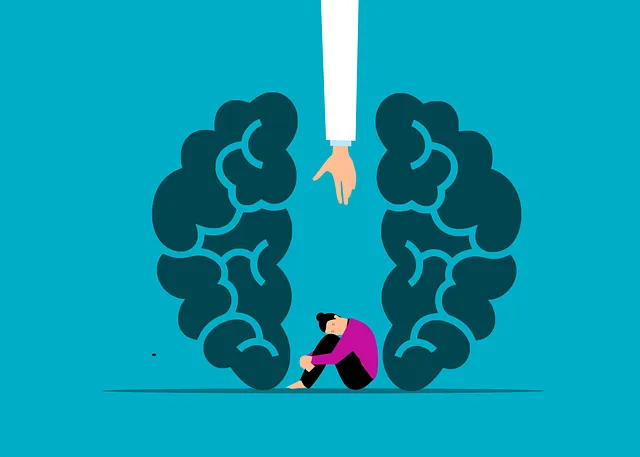Mental illness diagnoses in severe cases often require inpatient care, with Kaiser Permanente Lakewood offering specialized services. Qualified healthcare providers conduct comprehensive assessments and provide culturally sensitive care through training. Inpatient programs include individual therapy, group sessions, medication management, and psychoeducation, along with trauma support for co-occurring disorders. While hospitalization is not always necessary, understanding the distinction between Kaiser's integrated services and local providers is crucial for Lakewood residents seeking mental health treatment. Effective communication, public awareness, and evidence-based practices like CBT are key to navigating mental health journeys, empowering individuals to manage conditions through tailored treatment plans involving goal-setting, self-care, and regular therapy check-ins.
Mental illness diagnosis and treatment navigation can be a complex, daunting task. This article guides you through understanding mental health diagnoses, exploring the role of inpatient care, comparing options like Kaiser versus local providers, and uncovering support systems for recovery. We delve into building comprehensive plans to overcome challenges, ensuring a well-rounded approach to mental wellness. For those in Lakewood considering Kaiser’s inpatient mental health services, this is essential reading to make informed decisions about your or a loved one’s care.
- Understanding Mental Illness Diagnoses: Unraveling the Process
- The Role of Inpatient Mental Health Care: Is it Suitable for All?
- Navigating Treatment Options: Kaiser vs. Local Healthcare Providers
- Support Systems and Resources for Effective Recovery
- Building a Comprehensive Plan: Steps to Overcome Challenges
Understanding Mental Illness Diagnoses: Unraveling the Process

Understanding Mental Illness Diagnoses: Unraveling the Process
Navigating a mental illness diagnosis can be overwhelming, especially when exploring treatment options like inpatient care. Organizations like Kaiser in Lakewood offer comprehensive mental health services, including inpatient facilities designed to provide intensive, specialized treatment for severe conditions. The diagnostic process begins with an assessment by a qualified healthcare provider who will gather information about symptoms, medical history, and potential environmental factors. This may involve discussions around mood, thoughts, behaviors, and any traumatic experiences—all crucial elements in unraveling the complex nature of mental illness.
Cultural competency training for healthcare providers plays a significant role in this process, ensuring that individuals from diverse backgrounds receive culturally sensitive care. Additionally, trauma support services are integral to addressing co-occurring conditions. Tools like Mental Wellness Journaling Exercises can also guide patients towards self-awareness and better understanding their symptoms, making them active participants in their treatment journey.
The Role of Inpatient Mental Health Care: Is it Suitable for All?

Inpatient mental health care offers intensive treatment for severe or acute conditions, providing a safe and controlled environment. This form of care is particularly suitable for individuals experiencing psychotic disorders, suicidal ideation, or those who require constant monitoring and support to manage their symptoms effectively. For instance, facilities like Kaiser in Lakewood may provide specialized programs tailored to diverse needs, ensuring comprehensive treatment plans that often include individual therapy, group sessions, medication management, and psychoeducation.
However, not all mental health challenges require inpatient hospitalization. Many individuals benefit from outpatient services, community-based support groups, or even digital interventions focused on self-esteem improvement and mental wellness. Mental health awareness campaigns play a crucial role in destigmatizing these issues and encouraging people to seek help without automatically assuming they need intensive inpatient care.
Navigating Treatment Options: Kaiser vs. Local Healthcare Providers

When it comes to mental health treatment, the options can seem overwhelming. Two prominent choices in many areas include Kaiser and local healthcare providers. For instance, those living in Lakewood may wonder, “Does Kaiser have inpatient mental health services?” Understanding the differences between these options is crucial for making informed decisions about one’s well-being.
Kaiser Permanente, known for its comprehensive healthcare coverage, offers specialized mental health services in various settings, including inpatient care. Their approach emphasizes integrated care, where medical and behavioral health professionals collaborate. In contrast, local healthcare providers might consist of independent practices or community clinics with varying levels of expertise and resources. Effective communication strategies and self-awareness exercises can facilitate the navigation process, ensuring individuals receive tailored support. Moreover, public awareness campaigns development can play a significant role in destigmatizing mental health issues and encouraging those in need to seek appropriate treatment, whether through large healthcare organizations like Kaiser or local practices.
Support Systems and Resources for Effective Recovery

Navigating mental illness can be a daunting task, but robust support systems and resources play a pivotal role in fostering effective recovery. For instance, individuals often benefit from connecting with peer support groups, where they can share experiences and gain invaluable insights from those who understand their struggles. These groups provide a safe space for emotional expression and offer practical advice on managing symptoms. Additionally, seeking professional guidance from therapists or counselors equipped to handle various mental health conditions is essential. They employ evidence-based practices and facilitate the development of inner strength through techniques like cognitive-behavioral therapy (CBT).
In areas like Lakewood, access to inpatient mental health services at facilities like Kaiser can be a game-changer. These specialized programs offer intensive care, allowing individuals to stabilize and learn coping mechanisms in a controlled environment. Furthermore, emotional intelligence—the ability to recognize and manage one’s emotions—is a powerful tool for recovery. By enhancing emotional intelligence through counseling or workshops, individuals gain better communication strategies, improve their relationships, and navigate life’s challenges with greater resilience.
Building a Comprehensive Plan: Steps to Overcome Challenges

Creating a tailored, comprehensive plan is essential when navigating mental illness diagnosis and treatment. This process involves several key steps. Firstly, patients should seek an assessment from qualified healthcare professionals at facilities like Kaiser in Lakewood, renowned for their inpatient mental health services. During this assessment, individuals can openly discuss their symptoms, concerns, and personal goals, fostering a collaborative environment.
Once diagnosed, developing a strategic plan becomes crucial. This includes setting achievable milestones, incorporating resilience-building techniques, and integrating self-care practices to prevent burnout, particularly for healthcare providers. Regular check-ins with therapists or counselors facilitate progress tracking while allowing space for adjustments. By combining professional guidance, personal goal-setting, and proactive self-care strategies, individuals can successfully overcome challenges associated with mental health journeys.
In navigating the complex landscape of mental illness, understanding diagnoses, exploring treatment options like Kaiser vs. local providers, and accessing support systems are pivotal steps towards recovery. Whether considering Lakewood’s offerings through Kaiser or local healthcare, having a comprehensive plan that encompasses various resources proves invaluable. By recognizing the unique challenges and implementing effective strategies, individuals can find their path to healing and improved mental well-being.






